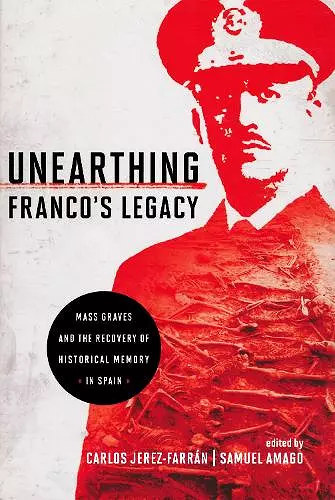Unearthing Franco's Legacy
Mass Graves and the Recovery of Historical Memory in Spain
Samuel Amago editor Carlos Jerez-Farran editor
Format:Paperback
Publisher:University of Notre Dame Press
Published:15th Apr '10
Currently unavailable, and unfortunately no date known when it will be back

Unearthing Franco's Legacy: Mass Graves and the Recovery of Historical Memory in Spain addresses the political, cultural, and historical debate that has ensued in Spain as a result of the recent discovery and exhumation of mass graves dating from the years during and after the Spanish Civil War (1936-39). The victor, General Francisco Franco, ruled as a dictator for thirty-six years, during which time he and his supporters had thousands of political dissidents or suspects and their families systematically killed and buried in anonymous mass graves. Although Spaniards living near the burial sites realized what was happening, the conspiracy of silence imposed by the Franco regime continued for many years after his death in 1975 and after the establishment of a democratic government.
While the people of Germany, France, and Italy have confronted the legacies of the repressive regimes that came to power in those countries during the 1920s, '30s, and '40s, the unearthing of the anonymous dead in Spain has focused attention on how Spaniards have only recently begun to revisit their past and publicly confront Franco's legacy. The essays by historians, anthropologists, literary scholars, journalists, and cultural analysts gathered here represent the first interdisciplinary analysis of how present-day Spain has sought to come to terms with the violence of Franco's regime. Their contributions comprise an important example of how a culture critiques itself while mining its collective memory.
“The illuminating, often riveting essays published shortly after the landmark legislation in Carlos Jerez-Farrán's and Samuel Amago’s important edited volume, similarly propose to navigate what contributor Francisco Ferrandiz has deemed ‘a formerly neglected cartography of terror and repression’ and to interpret the complex, intersecting pathways of political history, collective memory and cultural reforms of representation that emerge from the place of the exhumations. . . A great strength of this collection as a whole is the wealth of disciplinary perspectives brought to bear by renowned historians, anthropologists, literacy and cultural studies scholars, and journalists.” —Bulletin of Spanish Studies
“Unearthing Franco’s Legacy is a significant contribution to the field of transitional justice. Not only does it highlight how a country attempts to come to terms with a past in the face of oblivion and silence but it also brings to the fore questions related to peace agreements, how they affect individual victims and how they relate to broader issues of international law and crimes against humanity.” —The International Journal of Transitional Justice
“The volume . . . deals primarily with some of the main features and achievements of the historical memory movement and with the theoretical and methodological problems that the movement raises. . . . The achievement of this volume is that it introduces English-language readers to the issue of historical memory in Spain.” —American Historical Review
“The contributors to this volume memorialize victims by looking at a number of phenomena that illustrate their faces and voices. . . . Each section begins with commentaries that engage in intelligent dialogue with the ensuing essays. . . . Unearthing Franco’s Legacy is a seminal reference for Spanish Memory Studies.” —The Volunteer
"Unearthing Franco's Legacy is a timely contribution to a subject that has provoked serious discussion both in Spain and abroad. The scholars and practitioners whose work is represented in this volume address the issue of historical memory from different disciplinary angles, and the interdisciplinarity of the approaches adds much to the book's value and to the debates that persist regarding this topic." —David T. Gies, Commonwealth Professor of Spanish, University of Virginia
"For anyone interested in understanding the lasting impact of the Spanish Civil War on contemporary society, Unearthing Franco's Legacy is required reading. The editors of this book have brought together, and placed in constructive dialogue, a comprehensive group of international authors whose contributions result in a sweeping and devastating account of the war's deep wounds on individual lives and collective histories. Meticulously studying Franco's policies, their impact on the war's victims, and representations of the war's stories, both those unearthed and others that continue to be buried, this book makes terribly clear that the Spanish Civil War and its memory continue to teach us lessons about the responsibility of scholarship in deciphering the complexities of the past." —Jordana Mendelson, New York University
ISBN: 9780268032685
Dimensions: 229mm x 152mm x 21mm
Weight: 546g
408 pages